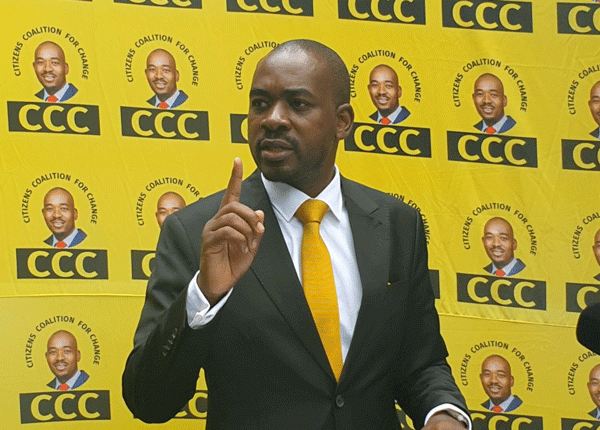
POLITICAL observers have expressed scepticism over the success of the Citizens Coalition for Change (CCC)’s diplomatic offensive to press for a fresh election.
The Nelson Chamisa-led CCC has refused to accept the outcome of the August 23 and 24 polls after describing the entire process as a blatant and gigantic fraud.
The opposition party’s rejection of the election results which saw President Emmerson Mnangagwa being declared the winner seemed to have gained impetus after Sadc and AU observer missions concluded that the country's polls failed to meet local, regional and international standards.
However, the CCC did not challenge Mnangagwa’s victory in court citing judicial capture and instead announced that it would pursue a diplomatic offensive for fresh polls.
However, political analyst Eldred Masunungure said the CCC’s diplomatic offensive will produce little to no results because Sadc is feeble.
“The brutal reality is that the diplomatic offensive will yield little at best and nothing at worst. The latter scenario is more likely for the simple reason that Zanu PF is not a malleable party that bends easily once it has taken a position no matter how untenable the position is. And Sadc has no history of firmness when dealing with member states. In short, the diplomatic route is blocked, thanks to Zanu PF’s intransigence and Sadc’s feebleness,” he said.
Zambia, which is the current Sadc Troika on Politics, Defence and Security chair, recently convened a virtual meeting during which the Sadc Electoral Observation Mission (SEOM) report on Zimbabwe’s just-ended disputed harmonised elections and other security challenges the region is facing were discussed.
Analyst Vivid Gwede, however, said: “As long as they observed the election and have an interest in upholding international democratic standards, the international community could help domestic players find a solution. So, engaging them makes sense. However, they are also guided by domestic developments in determining the threshold of necessity.”
- Zim headed for a political dead heat in 2023
- Record breaker Mpofu revisits difficult upbringing
- Students develop mobile app to support SRHR learning
- Tendo Electronics eyes Africa after TelOne deal
Keep Reading
Witwatersrand University-based political observer, Romeo Chasara said CCC’s hope lay in the stance and influence of international and regional entities, as well as the political and legal frameworks in place.
“While seeking international or regional intervention can be a strategic move, success is not guaranteed. Had it been that the Sadc observer mission did not condemn the elections already, it could have been crucial for CCC to present a compelling case, and demonstrate evidence of irregularities or issues with the election process, to garner support from influential actors in the international community. As things stand, it seems there’s little hope because those international bodies are aware of the activities that characterised the Zimbabwean elections but have done nothing to date. However, it seems to me that the potential for CCC to find the remedy they seek through these channels will be contingent on a complex interplay of political, legal, and diplomatic dynamics, making it difficult to predict with certainty.”
Senior lecturer at South Africa’s Tshwane University of Technology Ricky Mukonza added that the CCC's endeavours to get a remedy through international and regional bodies were not likely to yield much because of little or no action by the opposition and support on the ground.
“These bodies and other countries are less likely to vigorously pursue the Zimbabwean matter lest they be seen as interfering in the internal affairs of a sovereign country. Indications from Sadc regarding Zimbabwe are of a body that has moved on and is now planning for the Eswatini elections,” he said.
Southern Africa programme head for the Institute for Security Studies, Piers Pigou advised the CCC to explore all avenues to push for electoral reforms.
“I think there is an opportunity for some incremental progress, but this has to be complemented with a range of other actions by the CCC using the platforms that it has domestically, regionally and internationally to the light shone on reform deficits as part of a longer-term effort to find a way forward on a range of issues. Personally, I think this includes utilising all platforms to either expose their utility or their lack of utility and l would include the debt negotiation process,” said Pigou.











